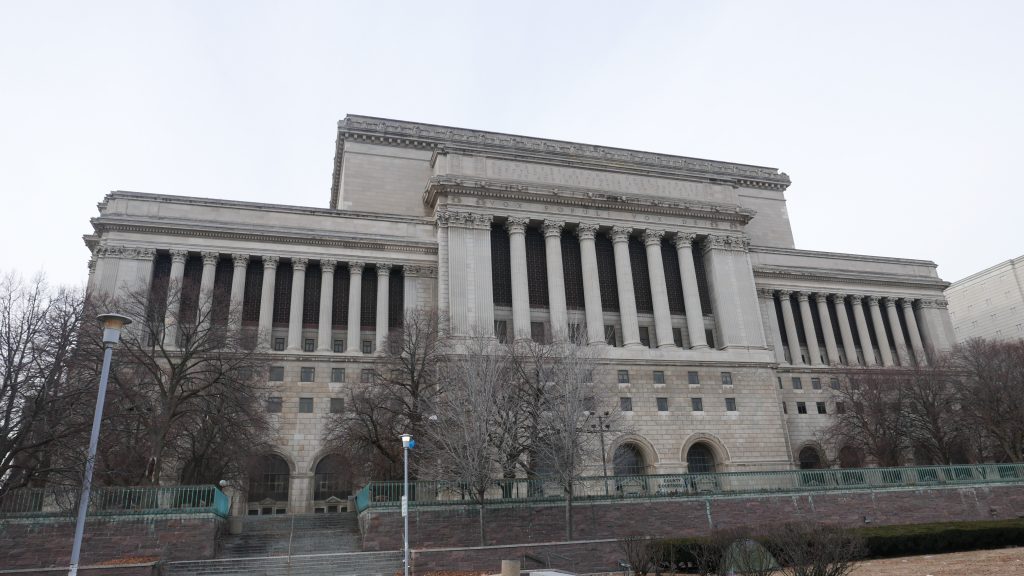Supervisors Engage in the Great Sales Tax Debate
See how and why each supervisor voted the way they did for new tax.
The Milwaukee County Board, no stranger to lengthy debates, deliberated for nearly two hours Thursday over a new 0.4% additional sales tax increase.
But the debate and discussion of a sales tax for the county has been ongoing for more than a decade. What occurred within the board’s chambers was less a debate than a series of speeches given by supervisors to explain their vote, and perhaps, persuade one of the few uncertain members that remained. Ultimately, the board approved the sales tax 15-3 with only Supervisors Ryan Clancy, Steve Taylor and Sequanna Taylor voting in opposition.
With the new sales tax, the county is projected to receive an estimated $82 million in revenue in 2024. This money is restricted to paying down the county’s massive unfunded pension obligation, but it will free up approximately $39 million to $49 million in property tax revenue previously dedicated to paying down the county’s pension costs.
Reducing the county’s pension obligation and freeing up property tax levy gives the county an opportunity to avert massive financial deficits over the next five years, estimated to reach approximately $109 million by 2028. County officials have gamed out these future budgets and say it would decimate the Milwaukee County Transit System (MCTS), parks, lead to the elimination of senior centers, and cause cuts across the board to county departments including critical human services.
Chairwoman Marcelia Nicholson was the first to speak on the sales tax vote before the board Thursday. She repeated to her colleagues that the proposal before them represented a “once in a generation opportunity” to right the county’s finances.
Nicholson, first elected in 2016, told her colleagues that she remembers the “gut-wrenching” budget votes of years past, before federal COVID-19 stimulus funds created a temporary reprieve, were poured into the county’s annual budgets. “I felt grateful if I could get $10,000 allocated to a district project,” she said.
She explained her view of the decision before them, saying that the board could either enact the sales tax or it allow the county to plunge into a financial crisis. She acknowledged that the vote was a difficult decision for many of her colleagues, but said that making massive cuts to county services like the transit system and parks amenities and laying off hundreds of county employees would be much harder votes.
While three supervisors voted against the sales tax Thursday, the only opposition spoken on the board floor came from Clancy and Taylor; a socialist and a conservative, respectively.
Taylor opposed the sales tax because he said he does not trust his colleagues on the board will spend the new funds wisely. He said he has spent his latest term on the board “playing defense” against “foolish” spending like a series of advisory referendums that went on ballots in 2022.
Clancy has opposed the sales tax since before enabling legislation was signed by Gov. Tony Evers. The supervisor has maintained that the sales tax is regressive because it taxes poor residents at the same rate as wealthy residents. Many supporters of the sales tax also acknowledge that it’s regressive, but say the loss of government services would be worse.
The supervisor sought to delay Thursday’s vote and held up a still-hypothetical proposal to use sales tax funds to make bus fares free. He wanted to hold the vote until his plan could be drafted and moved through the board’s committee process in September.
Sup. Shawn Rolland, a stalwart supporter of the sales tax, blasted Clancy’s effort to delay the vote, noting that state rules governing when a sales tax can be implemented mean such a delay would cost the county at least three months, or approximately $21 million in sales tax revenue in 2024. “We don’t have a bus plan,” he said. “There is no fiscal note for a bus plan. There’s not even an amendment on the floor for a bus plan.”
Clancy was the only supervisor that voted to delay the vote until September.
During the meeting Thursday, Clancy also once again downplayed the county’s financial position, saying the draconian cuts are “half a decade” away, referring to estimates that the county will face an estimated $109 million budget deficit in 2028.
But deficits await the board in 2024 without an additional sales tax. Sup. Willie Johnson, Jr. rose to remind his colleagues that the estimated deficit in 2024 is approximately $18.9 million, and projected to hit $52 million in 2025. Johnson also illustrated the practical effect the sales tax would have on the average person, “For a $100 purchase, the tax would be 40 cents.”
Johnson is the only current supervisor that was on the board when the disastrous pension plan that played a major role in destroying the county’s finances was approved. He was also one of the only supervisors to vote against the pension backdrop for non-union county employees, something noted by more than one supervisor Thursday. Though he did vote for the infamous backdrop for union employees.
“That pension destroyed the future for Milwaukee County. We’re here today to correct that mistake,” said Sup. Sheldon Wasserman.
A major piece of the board’s sales tax resolution was an authorization to have the county begin enrolling all new employees into the state-run Wisconsin Retirement System, beginning in 2024, and the eventual closure of the county-run pension system.
Sup. Liz Sumner put it simply: “We are reforming the pension today.” Sup. Deanna Alexander said closing the county’s pension system was one of the reasons why the vote was not hard for her. “For the first time in over a decade… we have a chance to make the Milwaukee County pension system a distant memory,” she said.
“Unfortunately, our peers years ago made a really bad decision,” said Sup. Patti Logsdon,
The board’s past mistakes and the potential for a new future weighed heavily on the debate.
“This may be the single most consequential vote I ever cast for this body,” said Sup. Steven Shea. The supervisor said he agreed with critics of the sales tax that say it’s regressive, but that his thoughts return to the county’s poor and disabled who rely on the bus system. “Asking them to walk anywhere from a half-mile to a mile to get to a bus, especially in winter, is as regressive as it gets.”
Like many others, Shea said he would have preferred solving the county’s financial problems another way. But he noted that the Republicans who control the state legislature did not give the county any other options. “This is a classic Hobson’s choice,” Shea said. “It’s this or nothing.”
This point about there being no other choice is something that supporters of the sales tax increase have regularly pointed to. Nicholson asked her colleagues how they would justify their seat on the county board to constituents if they don’t vote to protect county services..
Sup. Peter Burgelis rattled off a number of services the county provides like parks, transit, senior centers, senior meal programs, and told his colleagues, “If you don’t think that… is important, vote no.”
Alexander likened a vote against the sales tax and joining the state pension system to waiting for a grenade to explode and supporting it to using a scalpel to perform surgery. While the surgery is painful, it allows for healing. The grenade on the other hand, only devastation. “It would be irresponsible to choose the grenade option,” she said.
A conservative, Alexander said she doesn’t like the idea of raising taxes, but said supporting the sales tax and closing the pension system was “actually what is best for the taxpayers.” Adding, “This vote takes integrity to support.”
Sumner, a small business owner, took the floor to push back against business owners that opposed the sales tax. She said as long as their businesses are sound to begin with, there’s no reason a 0.4% sales tax would dissuade customers from patronizing them. She said anyone blaming the sales tax for their poor business should look inward.
Sup. Juan Miguel Martinez spent most of the past month voicing opposition to the sales tax on the grounds that it is regressive. But even in the days leading up to the board’s meeting, it remained a question of how exactly he would vote. Ultimately, he voted in favor of the sales tax. He acknowledged that his break with Clancy on the vote was an aberration. “You have all seen me in lockstep with Clancy… Today, I am not in agreement.”
Martinez explained that while he and Clancy are both members of the Milwaukee chapter of the Democratic Socialists of America (DSA), his vote was for his constituents, not the DSA.
The vote weighed heavily on several supervisors, like Sup. Kathleen Vincent, who told her colleagues she had not been sleeping well in the preceding days because of it. She, and other supervisors like Logsdon, said they wanted their constituents to know that they tried to listen to everyone, and really considered the input of their constituents. Ultimately, for Vincent, the human cost of not approving the sales tax proved too great. She mentioned a blind man in her district that uses the county’s paratransit services. “Although his voice might not be the loudest voice I’ve heard over the last several months, it resonates in my heart.”
Sup. Priscilla E. Coggs-Jones said her support for the sales tax was “the hardest decision I’ve had to make while on this board.” But she committed to watching how the money was spent and holding county officials accountable.
The newest supervisor on the board, Caroline Gómez-Tom, said that Thursday was only her 83rd day on the county board and that already she was having to understand and take a vote that many of her colleagues are calling the most important of their career.
The supervisor said “no amount of beer gardens or grants or fees” would save the county. She said Republicans in the state legislature who “don’t know Milwaukee, don’t care about Milwaukee” put supervisors in a position of having to choose between the sales tax or a financial crisis. “I’m making the best decision for my community with what I believe is our only viable option.”
For more on the sales tax vote, see our coverage from Thursday.
If you think stories like this are important, become a member of Urban Milwaukee and help support real, independent journalism. Plus you get some cool added benefits.
More about the Local Government Fiscal Crisis
- Mayor Johnson’s Budget Hikes Fees, Taxes In 2025, Maintains Services - Jeramey Jannene - Sep 24th, 2024
- New Milwaukee Sales Tax Collections Slow, But Comptroller Isn’t Panicking - Jeramey Jannene - Jun 28th, 2024
- Milwaukee’s Credit Rating Upgraded To A+ - Jeramey Jannene - May 13th, 2024
- City Hall: Sales Tax Helps Fire Department Add Paramedics, Fire Engine - Jeramey Jannene - Jan 8th, 2024
- New Study Analyzes Ways City, County Could Share Services, Save Money - Jeramey Jannene - Nov 17th, 2023
- New Third-Party Study Suggests How Milwaukee Could Save Millions - Jeramey Jannene - Nov 17th, 2023
- Murphy’s Law: How David Crowley Led on Sales Tax - Bruce Murphy - Aug 23rd, 2023
- MKE County: Supervisors Engage in the Great Sales Tax Debate - Graham Kilmer - Jul 28th, 2023
- MKE County: County Board Approves Sales Tax - Graham Kilmer - Jul 27th, 2023
- County Executive David Crowley Celebrates County Board Vote to Secure Fiscal Future and Preserve Critical Services for Most Vulnerable Residents - County Executive David Crowley - Jul 27th, 2023
Read more about Local Government Fiscal Crisis here
Political Contributions Tracker
Displaying political contributions between people mentioned in this story. Learn more.
MKE County
-
RNC Will Cause Some County Services To Be Moved to Wauwatosa
 Jul 12th, 2024 by Graham Kilmer
Jul 12th, 2024 by Graham Kilmer
-
Hank Aaron State Trail Will Be Closed For RNC, State Fair
 Jul 12th, 2024 by Graham Kilmer
Jul 12th, 2024 by Graham Kilmer
-
MCTS Designing New Bus Shelters
 Jul 10th, 2024 by Graham Kilmer
Jul 10th, 2024 by Graham Kilmer






















